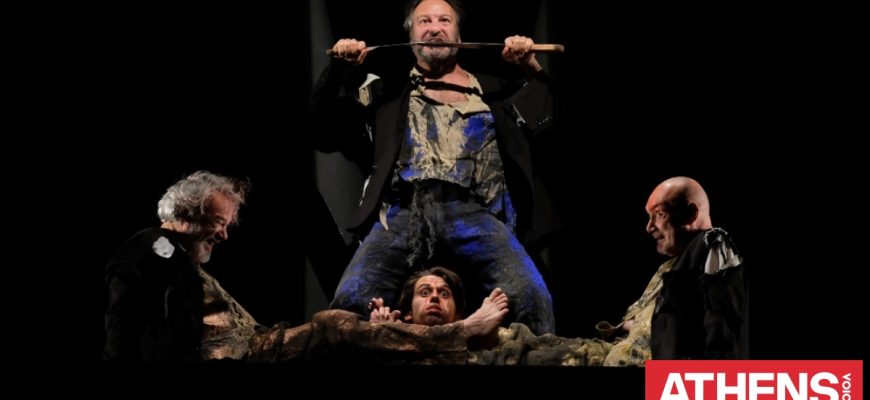That “Waiting for Godot” goes up for the first time at Stegi in a performance-station on the border between the monumental and the comic. The direction is signed by the most international Greek theater director, Theodoros Terzopoulos, directing an excellent Italian troupe, in a major co-production of Emilia Romagna Teatro which is on a world tour.
“Nothing is more real than nothing” he said Samuel Beckett (1906-1989) and with the Waiting for Godot (1948) hurls this “nothing” onto the stage like a meteorite. Because nothing remarkable, in terms of action and plot, happens in this work of the Nobel Prize-winning Irish thinker, poet and writer.
Two street outcasts, two clozars, Vladimir and Estragon, dressed in their rags, standing by a tree, talking about winds and waters, randomly meeting three equally strange guys, while basically waiting for someone else who never comes . Who, after all, is the Godot of the title who never appears? Some savior or even God himself, as the corruption of the name in English shows (Godot, from God = God)? Beckett has, however, admitted that what interested him was not so much Godot as “waiting”.
Theodoros Terzopoulos in rehearsal for “Waiting for Godot” © Johanna Weber
“Waiting for Gondo”: the performance by T. Terzopoulos at Stegi
This eternal waiting is directed by Theodoros Terzopoulos in terms of comic-tragic liturgy. In his performance, a black scaffold, like a funeral monument, stands on stage. A cross of light tears it in two. At its base, a tiny bonsai. Church hymns, tangos, bombings and war sirens resound.
There, like figures sprung to life from some unknown ancient zoophoro, lie waiting Vladimir and Estragon, played by the veteran Sicilian actors Enzo Veteran and Stephen Randisi. They play their roles with the insane wisdom and holy desperation of Buster Keaton. Figures capricious and contradictory, witty as well as naïve, airily waiting statically and ecstatically for the one who will never come to save them from the ontological impasse of existing always expecting something.
The show by Terzopoulos, the director who started in Makrygialos, Pieria and has been traveling the world for forty years with the Attis theater, teaching his wonderful method of acting from Asia to Australia, “reveals a crucified humanity, whose nails they are words” as the foreign publications note, to end up with the quote: “a show that will be written in the annals of modern theater”.
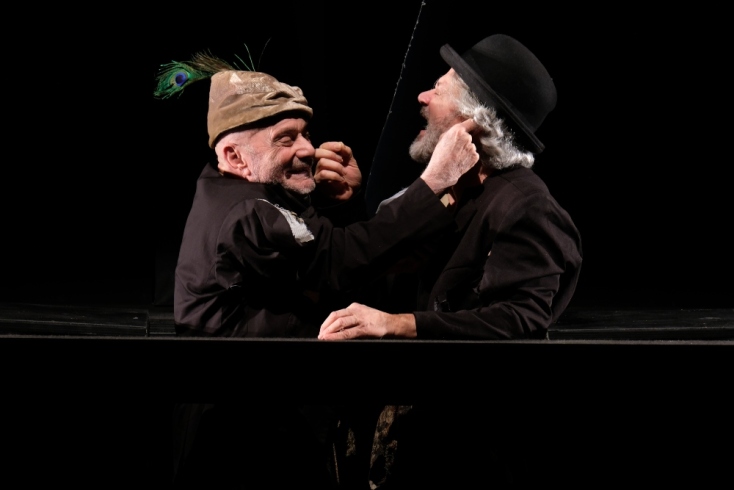
© Johanna Weber
O Theodoros Terzopoulos for his look at “Waiting for Godot”
O Theodoros Terzopoulos states: “Our performance is set in the “ruins of the world”, in a future, more or less, close to us, where all the wounds of the present and the past remain open. So are expectations… At this end of human existence, what are the minimum possible conditions for restarting life, a life worth living?
In “Waiting for Godot” there are two possible answers and that is where we base our work: The first is the effort to communicate and co-exist with the Other, the one who is in front of us, despite any obstacles, even when they seem insurmountable! The second is the effort to communicate with the Other within us, with that unfathomable and dark region of repressed desires and fears, of forgotten senses and instincts, the region of the animal and the divine, where madness and dream are born, the delirium and the nightmare.
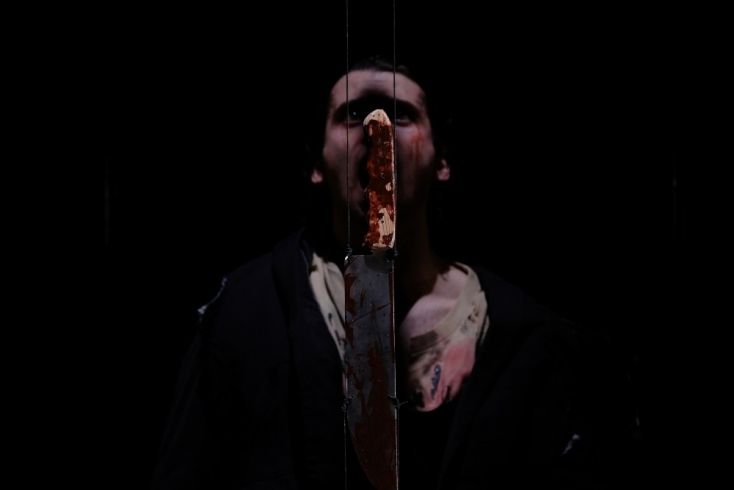
© Johanna Weber
This is the journey we have tried to make: towards the Other within us and towards the Other outside us, opposite, away from us. Waiting for what? The Redemption of life from the bonds of death? The meeting with the Man? The end of all humiliation of man by man? Nothing or Waiting, as Beckett quips? But is there another way to envision the emancipated man, without tearing down the walls that separate the “inside” from the “outside”?
The Waiting for Godot directed, stage design, lighting and costumes by Theodoros Terzopoulos, a great show and a priceless gift for the Greek audience who rarely have the opportunity to watch an international production by the Greek director for a theater abroad. The show makes a stop at the Onassis Foundation Roof, while it has already excelled with rave reviews in over 20 Italian cities and will continue its international tour from China to Bulgaria, from Hungary to Romania.
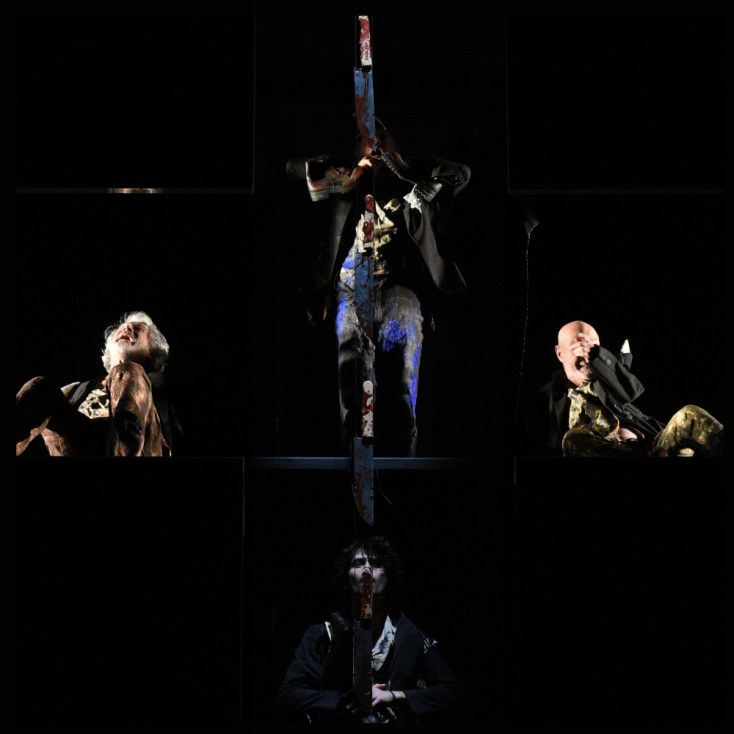
© Johanna Weber
The theater of Theodoros Terzopoulos
Internationally renowned Greek director, founder of a unique method of training the actor that is taught in chairs of theater and classical studies in more than thirty universities and national drama schools around the world, Theodoros Terzopoulos makes a theater that is different. It never talks about roles, characters or psychological motives. But he talks about the body of the actor, the god Dionysus and the ritual. Since 1985 and the establishment of the Attis theater and, with a landmark performance of Bacchus of Euripides in 1986, which radically overturned the way ancient Greek tragedy had been presented until then, introducing the elements of extreme physicality and ritual, has given more than 2,100 performances around the world: works by Aeschylus, Sophocles, Euripides, Brecht, Lorca , Müller, Beckett, Pasternak, Strindberg and contemporary Greek writers.
The international studies and books on the directing method of Theodoros Terzopoulos are published in more than ten languages, among them the recent double edition, in English and Arabic, by the historical German publishing house Theater der Zeit with the title “The Return of Dionysus ”, with the support of the Onassis Foundation.
Theodoros Terzopoulos’ first collaboration with the Onassis Foundation took place in 2018, with the support of the four-day International Meeting in his honor in Delphi and the presentation of Trojans of Euripides at the Ancient Theater of Delphi, with the title “The Return of Dionysus” and organized by the European Cultural Center of Delphi.

© Johanna Weber
A few words about Theodoros Terzopoulos
Theodoros Terzopoulos was born in Makrygialos, Pieria. He studied at the Kostis Michaelides Drama School in Athens (1965-67) and completed his studies at the Berliner Ensemble, in Germany (1972-76). From 1981 to 1983 he was the Director of the Drama School of the State Theater of Northern Greece in Thessaloniki, while in 1985 he founded his own theater group, the Attis Theater, in Delphi.
He has directed several ancient Greek tragedies and works by the most important modern Greek and European authors, giving performances in countless theaters internationally. In the last 35 years he has put on more than 2,100 shows with his team all over the world. He was the Artistic Director of the International Meetings of Ancient Drama in Delphi. He is also a founding member of the International Institute of Mediterranean Theater and President of its Greek section since 1991, as well as of the International Meetings of Ancient Drama in Sikyona (2005-2006, 2011). His dramatic approach to ancient Greek tragedy is taught in numerous schools, academies, institutes and university departments of classical studies.
He is the originator of an acting method that includes a series of physical and vocal exercises, which aim to cultivate the basic principles of acting practice and rebuild the unity between speech and body. Emeritus Professor at academies and universities in Greece and abroad, since 2013 he directs the summer workshop “The Return of Dionysus: The Method of Theodoros Terzopoulos” for young actors and directors. Books of his method have been translated and published in many languages: Greek, English, German, Turkish, Russian, Italian, Polish, Chinese, Korean and Arabic. He has been honored with many awards in Greece and internationally. Since 1995 he has been the president of the International Committee of the Theater Olympiad, events of which have been held in Delphi, Shizuoka (Japan), Moscow, Istanbul, Seoul, Beijing, Wroclaw, Toga (Japan), St. Petersburg and in 17 cities in India.
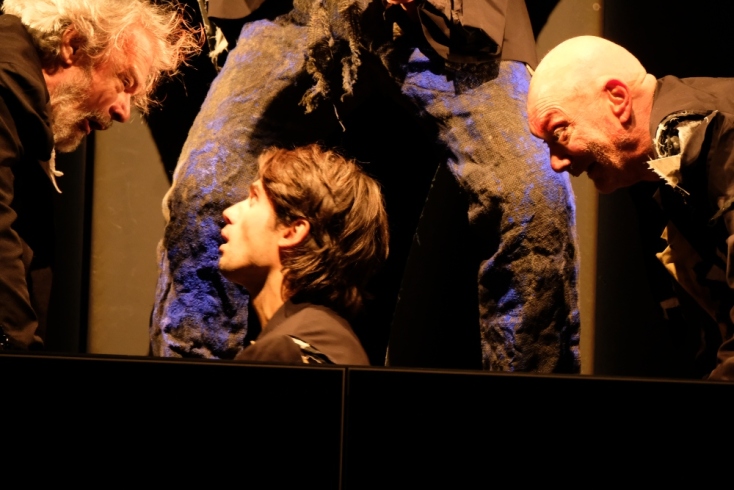
© Johanna Weber
INFO:
Onassis Foundation Building, Syngrou 107, Central Stage
Wednesday – Sunday 20:30
Duration: 90 minutes
The show is in Italian with Greek subtitles
Presale starts: Wednesday, April 24, at 5:00 p.m.
Tickets: Normal: €7, €20, €28, €38. Reduced, Friend, Group 5-9 people: €16, €22, €30. Group of 10+ people: €14, €20, €27. Neighborhood Resident*: €7. Unemployment, Disability: €5. Disabled companion: €10
*Neighborhood Residents tickets can be purchased exclusively from Stegi’s ticket offices, Wednesday to Friday from 12.00-18.00. Access from the “Artists’ Entrance” on Galaxia Street.
Coefficients
Copyright: Editions de Minuit
Italian translation: Carlo Fruttero
Direction, Set Design, Lighting & Costumes: Theodoros Terzopoulos
With (alphabetically): PaoloMusio, StefanoRandisi, EnzoVetrano and RoccoAncarola, GiulioGermanoCervi
Music: Panagiotis Velianitis
Assistant Director: Michalis Traitsis
Actor training assistant: GiulioGermanoCervi
Production: Emilia Romagna Teatro (ERT) / Teatro Nazionale, Fondazione Teatro di Napoli – Teatro Bellini
